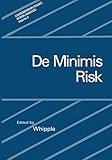De minimis risk [Libro electrónico] / edited by Chris Whipple
Whipple, Chris [editor].
Tipo de material: Libro
en línea Series Editor: New York, New York, United States: Plenum Press, c1987Descripción: xvi, 208 páginas : ilustraciones ; 26 centímetros.ISBN: 0306425300; 9781468452952 (Print); 9781468452938 (Online).Tema(s): Risk assessment -- CongressesNota de acceso: Disponible para usuarios de ECOSUR con su clave de acceso Nota de bibliografía: Incluye bibliografía e índice: páginas 207-208 Número de sistema: 55498Contenidos:Mostrar
Resumen:
Libro
en línea Series Editor: New York, New York, United States: Plenum Press, c1987Descripción: xvi, 208 páginas : ilustraciones ; 26 centímetros.ISBN: 0306425300; 9781468452952 (Print); 9781468452938 (Online).Tema(s): Risk assessment -- CongressesNota de acceso: Disponible para usuarios de ECOSUR con su clave de acceso Nota de bibliografía: Incluye bibliografía e índice: páginas 207-208 Número de sistema: 55498Contenidos:Mostrar
Resumen:| Tipo de ítem | Biblioteca actual | Colección | Signatura | Estado | Fecha de vencimiento | Código de barras |
|---|---|---|---|---|---|---|
| Libros | Biblioteca Electrónica Recursos en línea (RE) | Acervo General | Recurso digital | ECO400554986900 |
Incluye bibliografía e índice: páginas 207-208
Chapter 1. De minimis risk regulation.. 1. De minimis risk.. 2. De minimis risk as a regulatory tool.. 3. Application of the de minimis concept in risk management.. 4. Science and its limits.. Chapter 2. Quantitative aspects of de minimis risk.. 5. Significant risk is not the antonym of de minimis risk.. 6. On defining a de minimis risk level for carcinogens.. 7. De minimis risk and the integration of actual and perceived risks from chemical carcinogens.. 8. Carcinogenic potencies and establishment of a threshold of regulation for food contact substances.. Chapter 3. Regulatory applications of de minimis risk.. 9. Implications of de minimis risk concepts for OSHA.. 10. Applications of de minimis.. 11. The NCRP considerations on levels of negligible risk.. 12. A summary perspective on NRC's implicit and explicit use of de minimis risk concepts in regulating for radiological protection in the nuclear fuel cycle.. 13. The feasibility of establishing a de minimis level of radiation dose and a regulatory cutoff policy for nuclear regulation.. Index
Disponible para usuarios de ECOSUR con su clave de acceso
On May 29 and 30, 1985, a workshop was held to explore the legal, ethical, social, scientific, and practical aspects of the use of the de minimis risk concept for health and safety regulation. The workshop was sponsored by the Society for Risk Analysis and its National Capital Area Chapter, the Environmental Protection Agency, the Nuclear Reg ulatory Commission, and the Electric Power Research Institute. The two-day meeting was held in Washington, D. C. , at the Brookings Institution; however, the Brookings Institution was not a sponsor of the meeting and did not playa role in its program. De minimis risk policy considerations were addressed from a theoretical and phil osophical viewpoint, from a quantitative and methodological basis, and through insights gained with regulatory applications. The distinctions between these three approaches to the subject are not sharp; most papers in these proceedings address aspects of all three topics. The reader familiar with the literature on the use of risk assessment in regulatory policy and decision making will find significant new contributions to the field. One of these is the examination of regulatory actions-in particular actions by the EPA-in response to risks of varying magnitude. Many attempts to seek patterns in regulatory policies have been based on analysis of the implicit economic value in obtaining risk reductions. These analyses have typically found great variability in the marginal cost 1 effectiveness of regulatory actions. eng
Disponible en línea
Disponible en formato PDF
Subscripción a ELSEVIER 26 de diciembre del 2013
